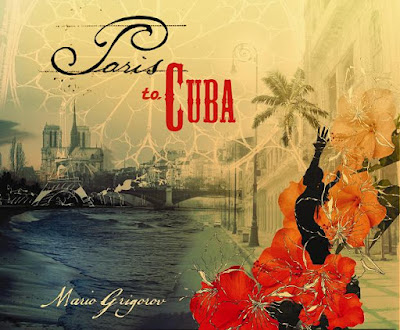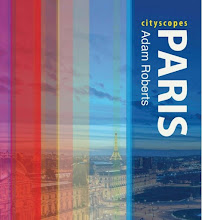 “I was trying to re-create the buildings I had seen that stood like frozen compositions”.
“I was trying to re-create the buildings I had seen that stood like frozen compositions”.The sentence struck me immediately, and instantly sparked a flood of questions in my brain. It appeared in a press release I’d received, a musician talking about his new album and the inspiration he’d taken from Paris. This was problematic though. It was not so much this communication that bothered me, but more the technique that was being used by the artist’s promotions agency. I was keen to find out more about this musician and his album, but each time I searched I was continuously directed towards other blogs. Blogs on cigars, blogs on Cuba and blogs on Paris. The same press release repeated twenty times and numerous competitions to win copies of the album. How could I find answers to my questions without becoming just another blog-cog?
The first step was to listen to the music. ‘Paris to Cuba’ by multi-instrumentalist Mario Grigorov, with vocals by Melissa Newman. The packaging is tempting and the title is seductive, but I vowed that I would only take the subject further if I liked what I heard and caught a glimpse of Paris reverberating in the notes. I listened several times. The music was cool, summery, imaginative, pretty, but I was hearing more twists of Cuba than splashes of Paris. New Orleans sometimes, Chicago or Miami, but then I get to the 6th track, Magic Circus, and suddenly I can see my home city. I decided that I would need to communicate with Mario Grigorov and find out exactly what he was trying to create or re-create.
 Grigorov is an interesting man. Born in Bulgaria to a family of musicians, he spent several years growing up in Iran where his father played in a symphony orchestra. He then spent time in Austria and Australia learning his trade before finally making his home in Los Angeles. He is a classical pianist, but also a fan of jazz and a composer of film scores, but where does his interest in Paris come from and what is his vision of the city?
Grigorov is an interesting man. Born in Bulgaria to a family of musicians, he spent several years growing up in Iran where his father played in a symphony orchestra. He then spent time in Austria and Australia learning his trade before finally making his home in Los Angeles. He is a classical pianist, but also a fan of jazz and a composer of film scores, but where does his interest in Paris come from and what is his vision of the city?I ask him what in particular in the city has inspired him. “Its the way the magnetic forces are lined up in that place” he replies. This rather West Coast philosophy is a little disconcerting, but his next comment appeals more to me, chronicler of the invisible; “there always seems to be more there than meets the eye” he continues, “so many layers of culture and beauty”.
He tells me that he was a regular visitor in the 90s, often following his wife who worked in the fashion industry. “I like the old town best” he says, without elucidating any further. I ask if he has any French influences and he cites Debussy and Ravel, two names that I do not find very surprising given their surface prettiness and more complicated, churning undercurrents. I’m still no closer to understanding why this world citizen is particularly inspired by Paris and its architecture though.
I ask about his past and how his frequent moves and changes of culture have affected him and influenced his music. “It was not by choice I lived in so many places” he says. Nevertheless he adds that “it made me who I am today and I hope that reflects in my music”. This album is a very deliberate contrasting of two cities and cultures, but he mentions that he was not trying to pick out specific musical styles but rather to express a mood and an emotion that he believes the two places share. When I tell him that this intrigues me and ask if he has found the French to be closed towards other cultures and over-protective of their own, he is not drawn into a debate. “I never felt lack of openness” he replies, “I usually ignore that emotion in people anyhow”.
 Most of the album winds around Latino-tinged rhythms, but what is the story behind the most Parisian track, Magic Circus? Here an accordion and a violin send us down narrow passages, and there is a vague feeling of menace in the air. Coming from an experienced soundtrack composer, it is easy to manage it being the backdrop to an imaginary film noir. It is a well-known fact though that if you want to keep your own impressions of a piece of music you should not ask the composer what they had in mind. “When I came up with the harmony on the piano it reminded me of Marcel Marceau doing his Clown interpretations” he informs me.
Most of the album winds around Latino-tinged rhythms, but what is the story behind the most Parisian track, Magic Circus? Here an accordion and a violin send us down narrow passages, and there is a vague feeling of menace in the air. Coming from an experienced soundtrack composer, it is easy to manage it being the backdrop to an imaginary film noir. It is a well-known fact though that if you want to keep your own impressions of a piece of music you should not ask the composer what they had in mind. “When I came up with the harmony on the piano it reminded me of Marcel Marceau doing his Clown interpretations” he informs me.Finally we come to the most important point for me. I tell him how intrigued I am by his comments on using architecture to express moods, and how he believes that music can recreate buildings. I ask what is special about the buildings of Paris in this respect and Grigorov immediately opens up and becomes more expressive. “The buildings there were built with such a fear of human grotesqueness” he says. Parisian architecture “makes me feel pleasant and content” he adds, before continuing on the theme. “All architecture is a frozen composition” he states. “When you treat a building as a piece of art or sculpture, and as your eyes move from one end of the building to another, there is a certain visual feast that reminds me of a well produced composition”
He is hoping to come and play some concerts in the city next summer, but until then we will have to make do with just the album. It will be part of my summer soundtrack and I find his city-as-sound ambitions to be very laudable. However there is a part of me that feels that he has only scratched across the surface of Paris, taking only bricks from the most visible and obvious of the city’s many frozen compositions. I think of a similar project, Barry Adamson’s ‘Moss Side Story’, an album that painted a very truthful, grimy and threatening picture of Manchester, and can’t help feeling that there is something missing from Grigorov’s portrait in comparison.
It proves one point perhaps though. Although buildings may well be frozen compositions, solid structures that we may all see the same way with our eyes, how they affect us emotionally and how we hear them will never be the same.














5 comments:
Goethe suggested that architecture is frozen music.
although I was told this after having circled around to the thought myself. So, one from The Well.
I think you have written the most incisive critique of an album I've ever read. I also believe that architecture speaks to each of us according to our personal history.
Splendid commentary--I've not heard of Grigorov's work, but I'm interested to hear it. Architecture and music, both based on proportional systems and manipulation. Each results in its own kind of temporal-spatial experience. So we of course can have both physical and sonic "landscapes". But architectural changes can have major, even brutal, impacts on people. I'm reading Colin Jones' book "Paris: Biography of a City" right now. Interesting and important to contemplate that the Haussmannian Paris that I enjoy so much was an aggressive "re-scoring" of the city when it was implemented -- welcomed by some parties, but totally devastating to other parts of Parisian society.
Margaret: I always look forward to your comments because they are not only incisive and pertinent but also provide links to many interesting things to discover!
My pleasure, Adam--I figure it's the least I can do considering what a consistent pleasure it is to read your IP posts. I have yet to encounter an entry that didn't leave me informed, entertained and *evermore* curious about Paris. You have a wonderful writing style, and I just hope you won't burn out doing all of this.
Post a Comment